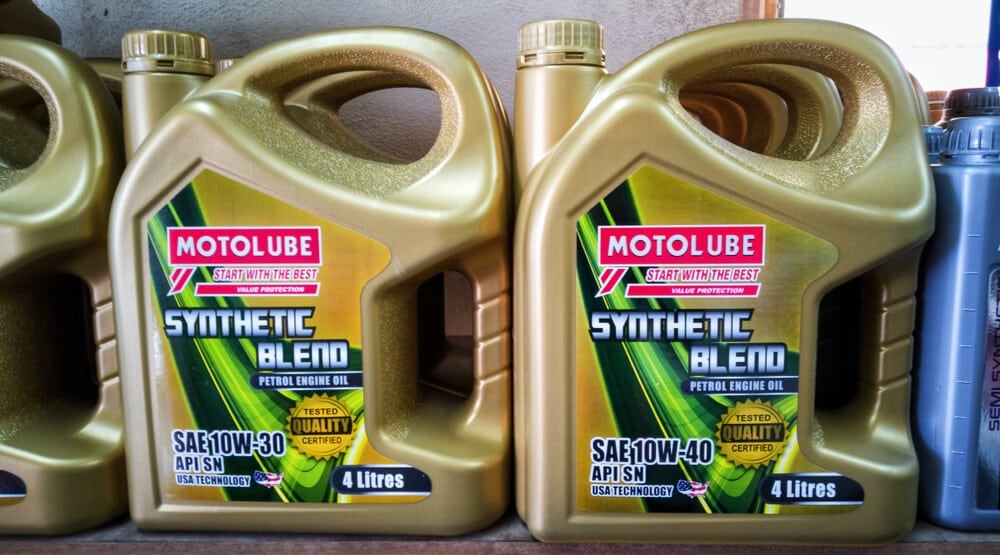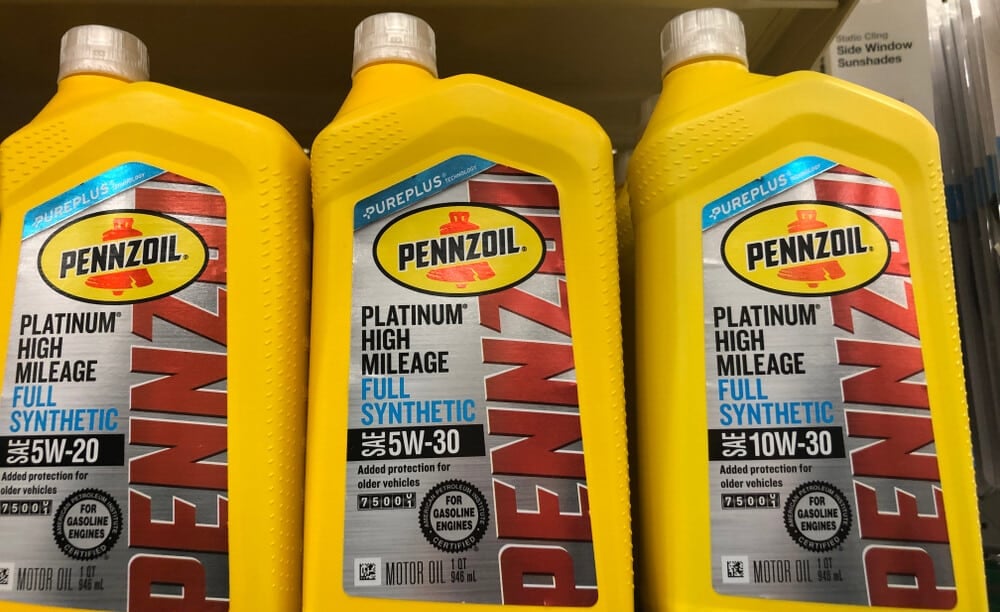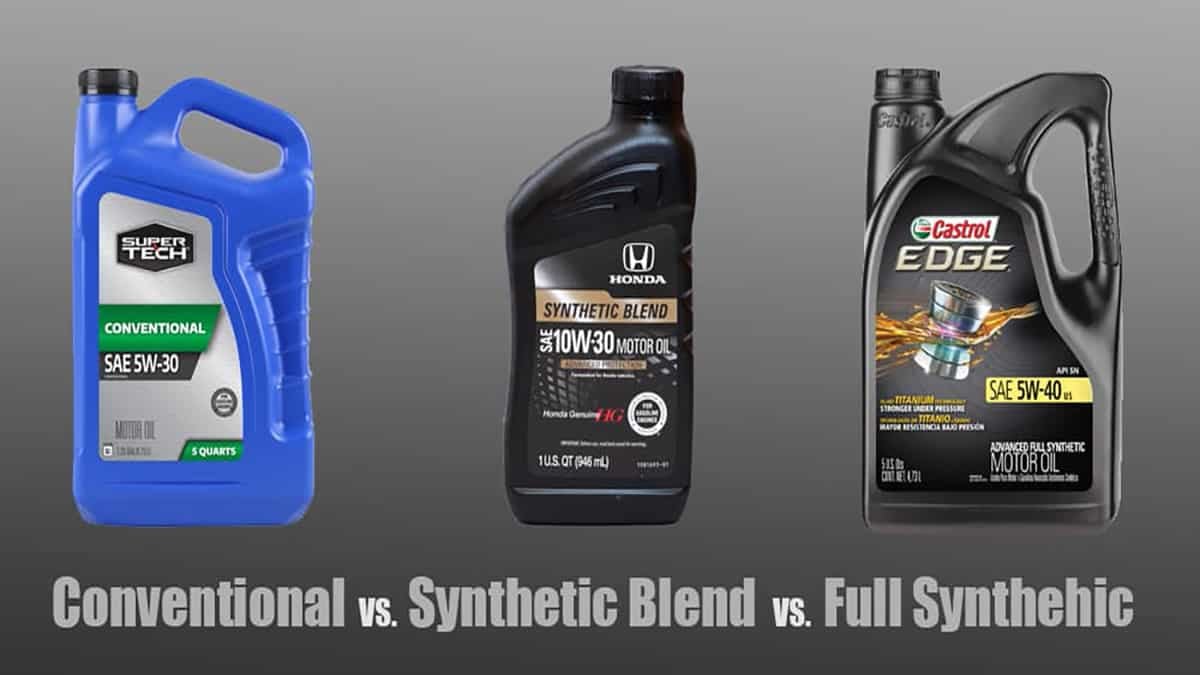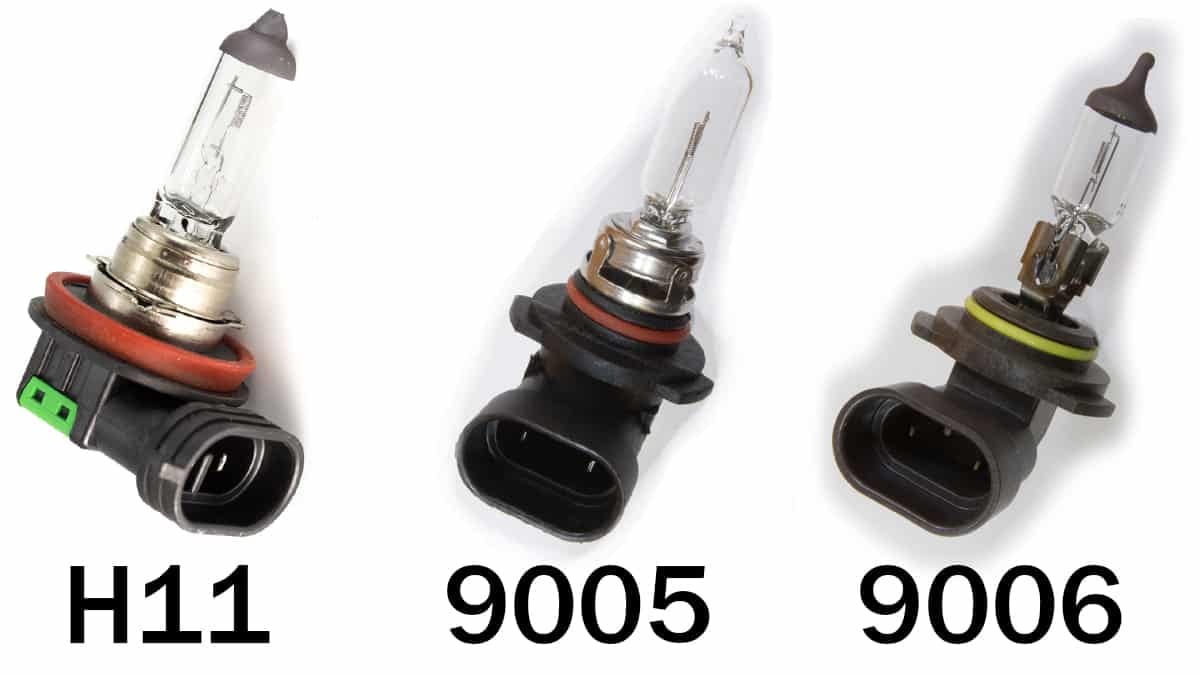You should change your vehicle’s motor oil every 3,000 to 10,000 miles, depending on what type you use. With several options to pick from, how do you know what’s best? Understanding the differences between conventional vs. synthetic blend vs. full synthetic oil is important.
This guide breaks down all of the pros and cons of the three popular oil types. We also show you how to pick the right type for your vehicle and answer some of your most pressing questions.
What is Conventional Oil?

Conventional oil is derived from crude oil after it has been refined to work in the car engine. At the molecular level, there can be some inconsistencies with the structure of the oil because of the process.
This type of motor oil has been around since 1866 when John Ellis started the Continuous Oil Refining Company. As he was studying the potential for healing with the use of crude oil, he discovered how the oil lubricated, making it an ideal candidate for machinery use. At first, the oil was used for steam engines.
At one time, conventional oil was all that was used in car engines. Today, it’s mainly used on cars with high mileage because conventional oil flows slower than synthetic, giving the worn-out motor more protection.
Pros
While most auto technicians agree that synthetic is a better oil overall, there are some pluses to using conventional oil. Here are some to consider.
- Affordable: Conventional oils cost far less than synthetic. The oil change is much cheaper overall.
- Accessible: Almost every auto repair shop and parts store has access to conventional oil.
- Perfect for old engines: Older models before 2000 were specifically designed to work with conventional oils. It provides the right amount of lubrication.
- High mileage protection: Because the oil flows slower, it can prolong the life of a high-mileage engine.
Cons
The list of cons outweighs what’s good about conventional oils, making them often less desirable. Here are some to consider.
- Less engine protection: The modern engine has narrow, thin oil lines. Traditional oils may struggle to flow properly and provide lubrication.
- Not temperature resistant: Cold and heat affect conventional oil negatively. Cold conditions make it thicker and more viscous, while heat causes it to degrade and evaporate.
- More consumption: Conventional oil degrades faster, leading to more consumption by the engine.
- Reduced fuel economy: The harder the engine has to work, the more fuel it will use.
- Higher emissions: The more fuel that’s burned, the more emissions are created.
- Short service life: You may need to change the conventional oil every 3,000 miles.
What is Synthetic Blend Oil?

Synthetic blends and semi-synthetic oils are essentially the same thing. Both refer to a motor oil that uses a combination of synthetic and conventional formulas. Because no regulations determine how much synthetic base oil must be used, the types can vary greatly.
Overall, the synthetic blend is going to cost more and last longer than conventional. Yet, it may not be as good as full synthetic, but it should cost less.
Pros
There are many benefits to choosing synthetic blends over conventional oil. Here are a couple of reasons to consider it.
- Lower cost than synthetic: You can get many of the same benefits as synthetic oil but for a slightly lower price.
- Increased fuel economy: With more lubrication for the engine, it doesn’t have to work as hard, so you should see better fuel economy.
- Reduced emissions: The better the fuel economy is, the lower the emissions are.
- Special detergents/additives: Companies put in special additives and detergents to boost the engine’s well-being.
- Longer service life: You don’t need to change the oil as often as conventional.
Cons
There are some troubles with synthetic blends that are important to recognize. Here are the major complaints.
- Cost more than conventional: You have to spend more than you would for a conventional oil change.
- Formulas differ: Because there are no regulations, you could be paying for something greater than conventional, but the formula may not be too much different.
- Not as accessible: Not all shops use synthetic blends. In fact, there’s speculation that these could be removed as an option in the coming years due to a big push toward full synthetic.
What is Full Synthetic Oil?

Synthetic oil combines artificial additives and chemicals with crude oil to create a replica of petroleum. They were first created by a group of German scientists during the 1930s and 40s for use during the war. However, synthetic motor oils didn’t gain popularity in automotive applications until the 1970s.
Because synthetic motor oils are manmade, they can include a variety of detergents and additives. For that reason, every company produces a different formulation, unique from others on the market. Some are better at reducing sludge, while others may have special anti-corrosion properties.
Pros
With more people turning to synthetic motor oils, you want to know what’s so great about them. Here are some of the top aspects.
- Designed for today’s cars: Auto manufacturers create new vehicles to work with synthetic oil. This formulation is preferred with variable valve timing, direct injection, superchargers and turbochargers.
- Greater chemical stability: The unique formulation makes the engine perform better.
- Good in any temperature: Synthetic oils perform well in low or high temperatures.
- Longer lasting: Oil changes may only be needed every 7,500 to 10,000 miles because of less degradation.
- Better for the environment: Because less oil is lost through the exhaust, emissions are decreased.
- Fewer engine deposits: Synthetic oil doesn’t leave behind the same deposits, giving you a cleaner engine.
Cons
Not everything is great with synthetic motor oils. There are still a few downsides to consider, such as these.
- Higher cost: You will spend more on synthetic oil because the company had to pay to synthesize it and add detergents.
- Harmful to older engines: Synthetic oils shouldn’t be used with older motors, especially rotary engines. Synthetic oil negatively impacts the seals, leading to costly damage.
How To Choose Oil Type For Your Vehicle

What type of oil does my car take? It’s important to figure that out before the next oil change. For starters, you should always follow the recommendations in your owner’s manual. Aside from that, there are a few factors to consider.
Vehicle Age
If you have a newer car with low mileage, you will probably want to go with synthetic oil. This type of oil is designed for the newer engines, especially when outfitted with turbo or superchargers.
On the other hand, if you have an older car or one with high mileage, you may consider a conventional one instead. It can provide more lubrication to help extend the life of your motor. At the very least, you should use a synthetic designed for high mileage.
Driving Style
The way you drive has a profound effect on what the motor needs. If you are regularly city driving, you are putting your engine through a lot of wear. The stopping and starting take a toll over time. The engine may not get up to full temperature, so it would be best to use synthetic oil.
The other side of driving in urban environments is the need to change the oil more often. If you don’t see the highways much, consider shortening up the oil change interval to provide maximum protection.
Cost
There are times when you don’t have a lot of cash to spend on car maintenance. We understand that problem but also know what happens when a car isn’t taken care of. As professional mechanics, we’ve seen car engines fail prematurely because of a lack of maintenance.
For that reason, you should never skimp on an oil change. You can save some money on conventional over synthetic oil, but it’s not as much as you would think once you look at the changing interval. For example, let’s assume that you are going to spend $45 for a conventional oil change. That oil change lasts you 3,000 miles before the next one. So, you’ve paid 1.5 cents per mile.
On the other hand, you may spend $75 for a synthetic oil change, but it can last you 10,000 miles. That’s less than a penny per mile, so you’ve actually saved money in the long run. Do the math before you assume conventional oil saves you money.
Changing Intervals
The changing interval is also going to have an effect on which one you choose. If you don’t mind changing the oil more frequently, conventional oil might be the answer. It usually only lasts for 3,000 miles before it starts to degrade.
On the other hand, you can use synthetic or a blend to get far more miles. Some are rated for up to 15,000 miles, although we don’t recommend going that long.
Is synthetic blend better than full synthetic?
No, full synthetic has the best performance of the two. However, the synthetic blend does offer some of the same properties and additives without the expensive cost. It’s reasonably priced, a little more than conventional, but slightly lower than full synthetic.
Is it OK to use full synthetic oil instead of a synthetic blend oil?
A synthetic blend does have some of the same properties as a full synthetic. Unless your owner’s manual specifies a different type of oil, you should be okay using full synthetic. However, if you have an older model or it has high mileage, you may consider using something different.
Does synthetic blend oil last longer than conventional oil?
Yes, the synthetic blend has some of the same properties as full synthetic. It’s going to last slightly longer than conventional oil, but probably not the full term of synthetic. Check the package to see how long it is supposed to last, but always follow the recommended maintenance schedule from your automaker.
What are the disadvantages of synthetic blend oil?
There aren’t any regulations with synthetic blend oils. Therefore, it’s difficult to determine how much synthetic oil is added to each formulation. Each brand is going to function differently based on what additives are included. Plus, you will spend more on synthetic blends than conventional oil.
When should you not use full synthetic oil?
Synthetic oil is great to use on most newer car engines. It has a lot of benefits, but it isn’t ideal for older cars, especially with a rotary engine. These motors rely on conventional oil to stay in good condition. You may also want to avoid synthetic oil if you have a high-mileage engine that needs more lubrication.
Conventional oil is made from crude oil with no synthetic additives. It’s the cheapest, but doesn’t last long before degrading. Synthetic motor oil offers a man-made combination to clean and protect the engine. While it’s more expensive, it will last longer. Synthetic blends offer a nice mix of the two.
Choosing between a conventional and synthetic or a synthetic blend isn’t difficult once you know what each has to offer. Research what’s recommended by the car manufacturer and stick to your maintenance schedule for the best outcome.
Categories: Engine Oil, Maintenance

















